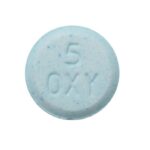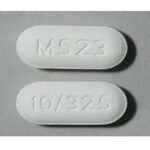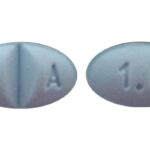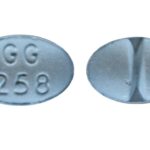M0552 Pill: Uses, Dosage, Side Effects, Street Value
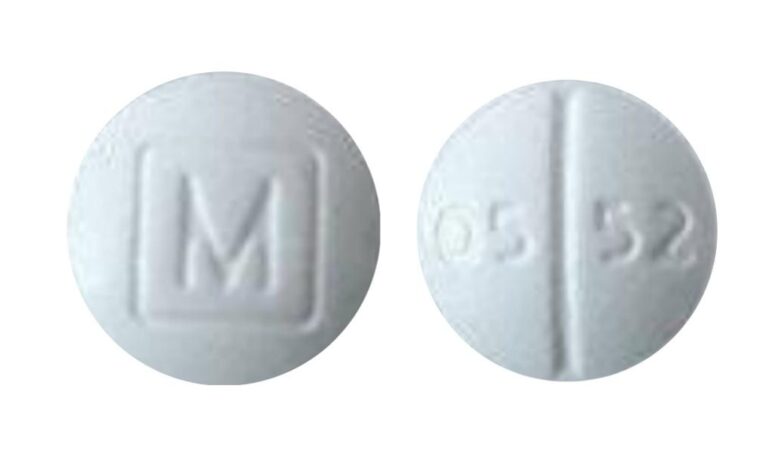
What pill has M0552 on it?
The white round pill with the imprint M 0552 has been identified as Oxycodone Hydrochloride 5 mg supplied by Mallinckrodt Pharmaceuticals. Oxycodone is a semi-synthetic potent opioid drug containing 5 milligrams of oxycodone a medication used to relieve moderate to severe pain in people who are expected to need pain medication around the clock for a long time and who cannot be treated with other medications. Oxycodone is in a class of medications called opiate (narcotic) analgesics. It works by changing the way the brain and nervous system respond to pain.
How should M 0552 pill be used?
Your prescribed dosage of M 0552 pill oral tablets depends on your level of pain and several other important factors. These factors include:
• whether you’ve ever taken an opioid in the past and what type of opioid you’ve taken
• the type of pain you’re having, such as acute (short-term) or chronic (lasting longer than 6 months)
• whether you’re switching to M 0552 pill from another opioid drug
• your age, weight, and overall health
• any other medications you’re taking
• your risk for misuse or addiction*
The maximum dose of oxycodone your doctor prescribes depends on your condition and your health history. Your doctor will prescribe the lowest dosage for the shortest amount of time that’s effective for managing your pain. They’ll carefully monitor you while you’re taking the drug to make sure you don’t have problems with it.
The solution, concentrated solution, tablet, and capsule of Oxycodone are taken usually with or without food every 4 to 6 hours, either as needed for pain or as regularly scheduled medications. Follow the directions on your prescription label carefully, and ask your doctor or pharmacist to explain any part you do not understand. Take oxycodone exactly as directed.
Your doctor will likely start you on a low dose of oxycodone and may increase this dose over time if your pain is not controlled. After you take oxycodone for a period of time, your body may become used to the medication. If this happens, your doctor may need to increase your dose to control your pain. Your doctor may decrease your dose if you experience side effects. Talk to your doctor about how you are feeling during your treatment with oxycodone.
Do not stop taking oxycodone without talking to your doctor. If you stop taking this medication suddenly, you may experience withdrawal symptoms such as restlessness, watery eyes, runny nose, sneezing, yawning, sweating, chills, muscle or joint aches or pains, weakness, irritability, anxiety, depression, difficulty falling asleep, or staying asleep, cramps, nausea, vomiting, diarrhea, loss of appetite, fast heartbeat, and fast breathing. Your doctor will probably decrease your dose gradually.
What are the side effects of M 0552 pill?
Common side effects of M 0552 pill include
• constipation,
• nausea,
• stomach pain,
• loss of appetite,
• vomiting,
• sleepiness,
• tiredness,
• drowsiness,
• dizziness,
• lightheadedness,
• weakness,
• itching,
• headache,
• dry mouth,
• sweating, and
• decreases in the ability to feel pain.
Tell your doctor if you experience serious side effects of M 0552 pill including
• respiratory depression,
• apnea (stopped breathing),
• respiratory arrest,
• circulatory depression,
• hypotension (low blood pressure),
• shock, and
• death.
What other drugs can interact with M 0552 pill?
Your doctor may prescribe M 0552 pill oral tablets together with other medications to manage your pain.
You may wonder if oxycodone has acetaminophen (Tylenol) in it. You might also question if oxycodone contains ibuprofen (Advil) or another nonsteroidal anti-inflammatory drug (NSAID).
Oxycodone comes as combination products with the following non-opioid pain medications:
- acetaminophen (Tylenol)
- aspirin
If your doctor prescribes a combination of oxycodone products for you, such as those listed above, do not also take doses of the individual drugs.
For example, Percocet is a brand-name combination drug of oxycodone and acetaminophen. If you take Percocet, do not also take acetaminophen or oxycodone in any form. Doing so could lead to an overdose of either drug.
Be sure to tell your doctor about all of the pain medications you’re taking. Ask your doctor about how to safely use other pain medications with oxycodone. They can provide more information on safe dosages.
Below, we describe oxycodone use with two familiar drugs: ibuprofen and acetaminophen. Be sure to check with your doctor before taking anything with M 0552 pill oral tablets.
M 0552 pill with ibuprofen
If you’re wondering whether you can take ibuprofen (Advil) with oxycodone, ask your doctor.
Combination products of oxycodone with ibuprofen used to be available for pain management. But they’re no longer available for use.
In some cases, your doctor may prescribe ibuprofen and oxycodone separately to manage your pain. But don’t take non-opioid pain medications such as ibuprofen or other NSAIDs with oxycodone, unless your doctor recommends it. Doing so could lead to serious side effects.
Be sure to ask your doctor about your pain treatment plan and how to manage your pain. Follow your doctor’s directions on how to take M 0552 pill oral tablets, with or without other medications.
M 0552 pill with acetaminophen
If you’re wondering whether you can take acetaminophen (Tylenol) with oxycodone, ask your doctor.
The combination drug Percocet, which contains both oxycodone with acetaminophen, is available to manage moderate to severe pain that’s not managed by non-opioid medications. It has similar boxed warnings as oxycodone has. Ask your doctor for more information about this combination medication. Be sure to let your doctor know about all of the medications you take.
If your doctor doesn’t prescribe this combination drug for you, don’t take oxycodone and acetaminophen together on your own. Doing so can lead to serious side effects including liver injury and overdose.
If your doctor does recommend that you take acetaminophen with oxycodone, you should not take any more acetaminophen or oxycodone than your doctor prescribes. Doing so could lead to serious liver injury.
Be sure to check with your doctor about your pain management plan and whether you can safely take anything with M 0552 pill oral tablets.
Questions about taking M 0552 pill oral tablet
Here’s a list of common questions related to taking M 0552 pill oral tablets.
What if I miss a dose of M 0552 pill oral tablets?
If you miss your scheduled dose of M 0552 pill tablets, take it as soon as you remember. But if it’s close to your next regular dose, skip the missed dose. Don’t take two doses of oxycodone at once. Doing so could lead to serious side effects such as slowed breathing, and even overdose.
Will I need to use M 0552 pill oral tablets long-term?
There’s no set time limit for how long you can take M 0552 pill oral tablets. But your doctor will prescribe them at the lowest dosage for the shortest amount of time to help with your pain. Long-term use of opioids, such as oxycodone, can lead to dependence. (With dependence, your body needs the drug in order to feel normal.) These drugs may also lead to misuse and addiction.
Can M 0552 pill oral tablets be chewed, crushed, or split?
No, you should not cut, chew, or crush M 0552 pill tablets. Instead, you should swallow the tablets whole with a full glass of water. If you have trouble swallowing the tablets, ask your doctor about other pain management options. Your doctor can discuss other forms of the drug, such as the liquid solution, which may be a better option for you.
Should I take M 0552 pill oral tablets with food?
You can take M 0552 pill oral tablets with or without food. But you should not take them with grapefruit juice or any products made with grapefruit. Doing so may increase the drug’s effects and cause more side effects. Also, be sure to drink plenty of fluids and get enough fiber in your diet while you’re taking oxycodone. This will help you avoid constipation with the drug.
How long do M 0552 pill oral tablets take to work?
How long it takes M 0552 pill oral tablets to work depends on your dosage and other individual factors. In general, the drug starts to work soon after you take it, within about 20 to 30 minutes. Your doctor can tell you more about how long it’ll take for oxycodone to work for your pain.
M 0552 pill Street Value
Available data from law enforcement agencies indicate that the average price per milligram of oxycodone is $1.15 mostly sourced from legal sources and diverted to the streets.
However, in recent times there has been an explosion of fake and illegally produced oxycodone pills containing fentanyl. These types of pills are responsible for the large-scale opioid overdoses and fatalities recorded in recent times.

